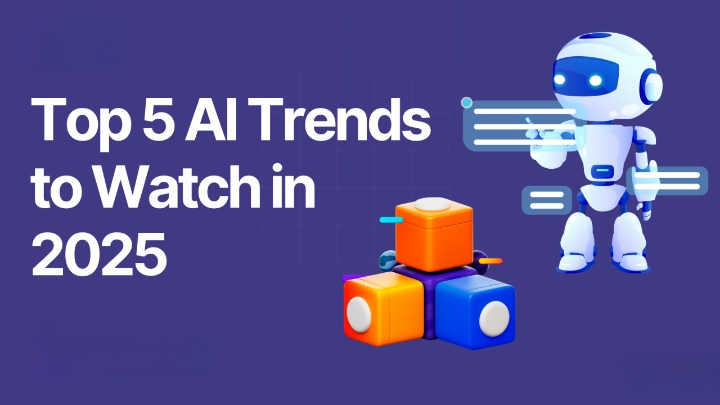Top 5 AI Trends to Watch in 2025
 Rajesh
Rajesh- 0
Artificial Intelligence continues to grow at a very fast pace, transforming industries and re-defining the way we interact with technology. As we step into 2025, AI is expected to further progress into everyday applications, making systems smarter, more automated, and ethically aligned with human values. Here are the top five AI trends to watch in 2025:

1. Generative AI Goes Beyond Text and Images
GPT-4 and DALL·E lead the current generative AI advancement by generating text and images as well as musical compositions. Video generation through generative AI will combine with 3D modelling and synthetic simulation technology when the new year arrives in 2025.
Key Developments:
- AI-Generated Videos: The development of AI video creation tools provides platforms with technology to manufacture ultrarealistic video content which eliminates the requirement for traditional video production techniques.
- 3D Content Creation: AI systems will give businesses the power to create realistic 3D items which enhance virtual reality (VR) along with augmented reality (AR) and gaming experiences.
- Synthetic Data for AI Training: AI models will create synthetic data datasets for training machine-learning systems, so the systems function better with less bias.
Impact:
- AI will make content creation more reachable to both business enterprises and individuals who can now create top-quality media without needing major funds or extensive resources.
2. AI-Powered Personal Assistants Become More Human-Like
Siri along with Alexa and Google Assistant will experience a fundamental transformation until they develop into intelligent assistants who understand human dialogue and display emotional intelligence.
Key Developments:
- Multimodal AI: Future assistants will understand and respond to a all kind of human body language like facial expressions.
- Hyper-Personalization: AI will analyze users’ behaviours and enable to offer more personalized recommendations.
- Real-Time Translation: AI-empowered translation technology will create instant and automatic language conversions between all major global languages through its real-time operation.
Impact:
- Business operations depend on AI assistants to strengthen their customer support activities and execute automated procedural functions.
3. AI Ethics and Regulation Gain Momentum
The growing strength of AI systems will force communities to face head-on three essential ethical problems involving bias inferences and data security risks together with false information dispersal. The period of 2025 will bring forth formal governing structures that enforce tighter limitations for AI utilization to preserve ethical AI conduct.
Key Developments:
- Transparent AI Models: The requirement emerges for programming teams to build transparent methods through which AI creates decisions while ensuring full accountability.
- Stronger Data Privacy Laws: The enforcement of stronger data privacy laws by countries will occur to defend user information and stop AI abuses.
- Bias Mitigation in AI: Researchers will create methods to eliminate bias from AI models which will establish fairness among different demographic populations.
Impact:
- Behind their operations organizations will make cleanliness in AI development a top priority while prioritizing fairness transparency and accountability in their ethic development practices.
- Users will achieve more control regarding their information thus establishing increased trust when utilizing AI-powered systems.
4. AI in Healthcare Revolutionizes Diagnosis and Treatment
The healthcare industry will experience high advancements with diagnostics driven by AI, robotic surgeons, and personalization of medicine.
Key Developments:
- AI-Powered Medical Imaging: Detection of diseases will be more accurate and can be detected in early stages
- AI Drug Discovery: The development of new drugs and treatment plans will receive speedier initiation through machine learning algorithms which execute drug discovery functions.
- Personalized Healthcare Plans: AI will analyze genetic data of patients and will be able to create customized treatment plans for individual patients.
Impact:
- Medical practitioners can expect increased treatment success from AI-generated treatment plans which in turn will create higher efficiency in healthcare delivery.
5. AI-Powered Autonomous Systems Reshape Industries
Autonomous AI systems will extend over self-driving cars to rediscover more advanced applications in industries such as logistics, manufacturing, and smart cities.
Key Developments:
- Self-Learning Robots: Robot systems using AI will automatically acquire new capabilities through learning from their operational environment to enhance performance in logistical operations and production lines.
- AI in Smart Cities: Create an ease of living with AI applications like managing city traffic etc
- Autonomous Vehicles: AI will power independent delivery robots, drones and taxis which reduces the necessity for human operation.
Impact:
- Companies will use AI automation systems to enhance operational efficiency while decreasing their expenses.
Conclusion
AI in 2025 will be more evolved into everyday life. From AI advancements to AI governance, these trends will shape the future of technology and society. As AI continues to evolve, continuous innovation while ensuring responsible development will be key to unlock its full potential.
Author
-

Rajesh Yerremshetty is an IIT Roorkee MBA graduate with 10 years of experience in Data Analytics and AI. He has worked with leading organizations, including CarDekho.com, Vansun Media Tech Pvt. Ltd., and STRIKIN.com, driving innovative solutions and business growth through data-driven insights.
View all posts
